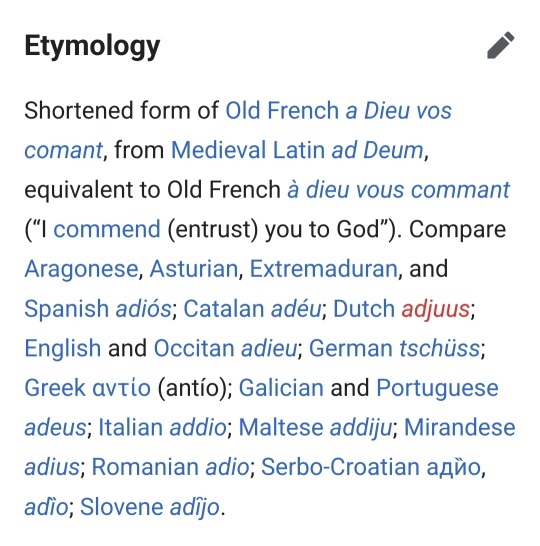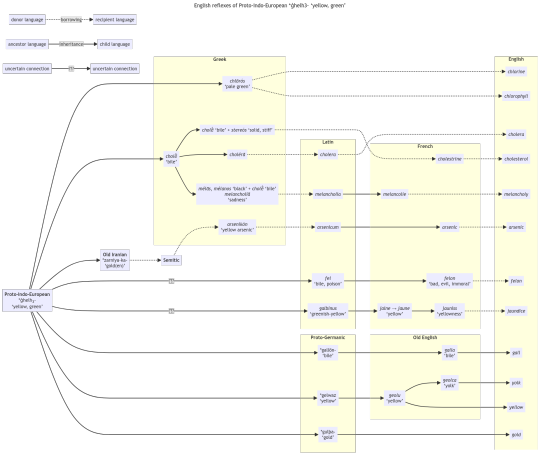#french etymology
Explore tagged Tumblr posts
Text
Asexous Pride Flag

Asexosity (asexuation) or asexuous (asexous or asextrous): sexless; without sex; asexual; genderless; agender; not involving sexual intercourse; sexual lifelessness.
Based on asexué (French), and bisexous/bisexuous.
#mod ap#asexous#asexuous#asex#asexual#asexy#pride flags#mogai#liom#lgbtqia+#agender#genderless#sexless#ace spectrum#flag edit#french etymology
42 notes
·
View notes
Text

Wool & lana
The word lana (wool) in languages such as Spanish is etymologically related to English wool. For words to be related, they don't have to look like each other. Instead, you have to be able to trace them back to the same ancestor through regular sound changes - and that's what linguists managed to do with wool and lana. The infographic shows the Germanic and Romance family trees of these words.
#historical linguistics#linguistics#language#etymology#english#latin#french#dutch#german#spanish#proto-indo-european#proto-italic#proto-germanic#gothic#norwegian#swedish#old norse#danish#icelandic#catalan#portuguese#italian#romanian#low saxon#frisian#lingblr
408 notes
·
View notes
Photo

Origins of French Département Names
69 notes
·
View notes
Text
i was just thinking how interesting the word oboe is because usually when we take a word from french we preserve the spelling to some extent, and oboe looks nothing like hautbois. so i looked up the etymology and apparently we got it through italian??? mystery solved i guess but that is such an interesting pathway for us to get a french word!
#also seems like an interesting way for italian to spell something but what i know about italian could fit on the head of a pin#and it was in the 18th century so who knows how they were spelling things back then or what dialect we're talking about#and apparently we already *had* the word hautboy in english?? so why did we also need oboe?#so one mystery solved and several more unlocked#etymology#english#french#italian#my posts
170 notes
·
View notes
Text
So fucked up that the words faux and phony sound similar and mean the same thing, but share not a single letter. Like I don't have anything to say about this. But it's a little fucked up. Isn't it?
#they also have completely different etymology. 'faux' is french for false and 'phony' is derived from 'fawney'#(which is derived from the gaelic word 'fainne' (which means ring). it's in reference to scams involving gilt rings apparently.)
153 notes
·
View notes
Text
remember that post about how goodbye has Christian roots? I just looked up the etymology of "tschüss" and well fuck

and then of course Fr. adieu:

in conclusion: Norddeutsche machen's richtig
#langblr#german langblr#etymology#german#french#l#r.wiki#. remind me to add image descriptions later
125 notes
·
View notes
Text
candy
late 13c., "crystallized sugar," from Old French çucre candi "sugar candy," ultimately from Arabic qandi, from Persian qand "cane sugar," probably from Sanskrit khanda "piece (of sugar)," perhaps from Dravidian (compare Tamil kantu "candy," kattu "to harden, condense").
39 notes
·
View notes
Note
okay i just saw one of your reblogs and idk if you’ve posted something like this already but do you have any alecto headcanons 🤗
alecto is the mean girl, it girl, that girl of hogwarts. she has a 10 step skincare routine and wears chunky loafers with her uniform. her skirt is rolled and she wears knee high socks year round. she's renowned for hogging the shower & bathroom and talking mean shit with her brother.
she shares a name with one of the furies whose role was to avenge by cursing mortals with madness. this is alecto! she bears hundreds of grudges, she has the messiest meanest breakups, she is merciless & cruel to hogwarts students when they misbehave. unceasing anger and unimaginable vanity!
#hi eva!!!#she is a FREAK with her brother#they are hogwarts biggest most devotional haters#they are rich kids gone wrong they tortured the poor French nannies and abused the ski instructors#the only positive of being a classics student is having name etymology engraved into my head#electo carrow#she is regina george crossed with nemesis#a
19 notes
·
View notes
Text
actually going with the headcanon that robin’s family is italian. she grew up speaking english but she started learning italian from her grandma one summer, and after her grandma died she was determined to keep learning so she kept up with it and became fluent. afterwards she started learning spanish for fun and found it helpful that she knew italian because some words are similar. then robin took french at school where she shared a class/club with nancy (and they worked on their pronunciation together)
#kinda mentioned this before but i like robin learning one of her languages from her family.#when robin cooks for nancy she's like trust me nance i'm actually italian i know how to make good pasta (she almost burns down the kitchen)#i also really like her getting into latin bc i think she'd be into root words and etymology#robin buckley#nancy wheeler#ronance#stranger things#honestly can't remember if nancy was in french club or not i swear i saw her yearbook photo that mentioned it
11 notes
·
View notes
Text
Etymology of 'trance'
late 14c., "state of extreme dread or suspense," also "a half-conscious or insensible condition, state of insensibility to mundane things," from Old French transe "fear of coming evil," originally "coma, passage from life to death" (12c.), from transir "be numb with fear," originally "die, pass on," from Latin transire "cross over, go over, pass over, hasten over, pass away," from trans "across, beyond" (see trans-) + ire "to go" (from PIE root *ei- "to go"). French trance in its modern sense has been reborrowed from English. As a music genre, from c. 1993. —Etymonline
100 notes
·
View notes
Text
that meme of the three generations of guys pouring beer into the next generation's mouth but the beer is sailing terms & it's dutch pouring it into english which is pouring it into french
#lot of these you look up the etymology & it's consistently like. dutch -> english -> french asjkdhfjsjks#thoughts
34 notes
·
View notes
Text

Sí, oui, òc!
Italian sì, Spanish sí, Portuguese sim and many more Romance words for 'yes' come from Latin sīc, which meant 'so; thus; like that'. In Popular Latin it got an extra meaning: 'yes', born out of the sense 'like that', i.e. 'like you said'.
French oui has a completely different origin. It comes from Old French oïl, a univerbation of o il, literally 'yes, it (is/does/has etc.)'.
O stemmed from Latin hoc (this), which became òc (yes) in Occitan, a group of languages whose name was derived from this very word.
#historical linguistics#linguistics#language#etymology#english#latin#french#spanish#aromanian#romanian#franco-provençal#catalan#galician#portuguese#proto-indo-european#proto-italic#occitan#lingblr
380 notes
·
View notes
Text
Magic tricks aren't for cats
Based on @thewigsnatcher764's ask :D

A/N : I made it a small story because I was inspired, oops? Also please consider reblogging instead of liking posts because likes don't boost posts and just make them die <3
"Encore ?! Aw, come on mon minou, how do you manage to fail this trick everytime ?"
Pluto looked up from the small coin that has fallen from his hand, and stared at his friend, deadpan. Duke were offering him this half-amused, half-confused grin that he was starting to know well.
"You're bad at explaining it." The short boy answered, still not impressed by the gap between their respective skills in magic tricks.
Duke exaggerated a shocked gasp, laying a hand on his chest in faked disbelief. "Comment peux-tu dire une chose pareille!" As he spoke, his dark-haired friend bent down and picked the golden coin, looking at it closely. "You're the one who's bad at understanding what I say!"
Without even answering to the dig, Pluto tried to reproduce the trick again. He closed his fingers around the buck, attempting to hide it away, but despite his agility, his fingers ripped, sending the coin into the air as he tried to catch it in flight, the round slice bouncing on the skin of his hands and changing direction, until it touched the floor. Again.
The pale-skinned boy looked up at Duke again. "Deer?"
For a second, the magician furrowed his brows, puzzled both by his friend's inability to success the trick, and by his terrible accent. "No. Dire. It means to say, to express with words."
"So..." Pluto looked down for a second, searching in his memory for something that he knew a lot better than magic tricks. "It's latin."
This time, Duke didn't fake the massive confusion that his expression was showing as he answered with disbelief, while his friend picked the coin again. "Quoi? No! It's French!"
The short boy looked up at Duke, raising a brow underneath his black strand of hair. "What I mean is... It comes from the classic latin dīcĕre. Isn't it ?"
The brown-skinned man took a moment to connect the dots, before his usual, prideful smile came back and he walked closer to Pluto, grabbing his shoulders in a friendly way. "I couldn't tell you even if I wanted to, mon minou. De nous deux, I'm not the nerd. Now what about we try this little trick again?"
Pluto sighed, deceived to see his diversion had been noticed. Looking at the coin in his hand, he complained. "But why don't you teach me some French instead? I'm sure I'd be better at it than I will ever be with your weird pranks!"
Those last words made Duke frown slightly, his ego touched. "Je ne te permet pas! Those tricks are very distracting and useful!" His sulking didn't last long however, and the trickster cracked an amused smile at his friend's annoyance. Raising a finger in the air, he continued cheerfully. "Besides! You really think I would grant you with the capacité to comprehend such a sophisticated language that is French?"
Rumbling a little in annoyance, Pluto hid his hands in his pockets and tried to argue. "It it really that complicated ? It just sounds like you put weird syllabus next to each others and twist your tongue at impossible angles."
Duke snickered, enjoying his friend's grumpiness as he answered on the same tone as before, determined not to let the pale-skinned boy have his way. "Oh, no mon minou! You need a lot more finesse than that! Well..." The magician looked at his friend with a smirk. "At least enough of it to manage the simplest tricks."
The black-haired student deadpanned at him, unmoved by Duke's attempt to motivate him. Moving away from him and taking the coin out of his pocket again, Pluto put it in evidence for his friend to see, before closing his fingers around it, and throwing the buck over his shoulder. Opening his hands again, he showed his two empty palms to a not-so-convinced Duke, who looked at him curiously. "Here. I succeed. It disappeared."
The brown-skinned trickster laughed frantically, amused. "Ha! Je ne l'avais pas vu venir! I didn't expect that!" He stopped his laugh and wiped an imaginary tear from the edge of his eye. "Oh well, mon minou..." As he spoke, enjoyment in his voice, Duke came closer to the short boy, and wrapped his arm around Pluto's shoulders, before leading him to the dinning hall. "Alright, alright, laisses tomber, let's drop this for now. Our friends are surely waiting for us downstairs."
And with that, the black-haired boy was safe from Duke's teaching methods. At least for now.
#pluto nevermore#duke nevermore#nevermore duke#nevermore webcomic#nevermore webtoon#nevermore pluto#the misfits#webtoon#webcomic#short story#nevermore fanfic#fanfic writing#whispers from atlantis#author is french and played with it#yes i also did etymology researches lmao#kinda long post
35 notes
·
View notes
Text
Daily French Etymology #55
Days of the Week
Lundi was derived from the Latin *Lūnae diēs, a variant of diēs Lūnae, meaning day of the moon. Lūnae comes from Luna, meaning moon, which was ultimately derived from the PIE root *lówksneh₂, meaning moon, from *lewk which meant to shine.
Mardi came from the Latin diēs Mārtis, meaning day of Mars, the god of war. The name Mars was derived from the Old Latin Mavors, from the Proto-Italic *Māwortis.
Mercredi originated from the Latin diēs Mercuriī, meaning day of Mercury, the Roman equivalent to Hermes. The name of the god, Mercurius, may have come from merx, meaning merchandise.
Jeudi comes from the Latin diēs Iovis, meaning day of Jupiter, the king of the gods. Jupiter, or Iupiter, was derived from the Proto-Italic *djous patēr, meaning father of the gods. *Djous, meaning day or sky, came from the PIE root *dyew-, meaning to be bright.
Vendredi was derived from the Latin diēs Veneris, meaning day of Venus. The name Venus originated from the Proto-Italic *wenos, meaning love, from the PIE root *wenh₁- meaning to wish or love.
Samedi came from the Vulgar Latin *sambatum, from the Latin diēs Sabbatī, meaning day of the Sabbath. Diēs Sabbatī originated from sabbatum, meaning Sabbath, from the Ancient Greek sábbaton. sábbaton was derived from the Biblical Hebrew shabát, of the same meaning.
Dimanche comes from the Late Latin diēs Dominicus, meaning day of the Lord. Dominicus originated from the Latin dominus, meaning lord or master.
* Indicates a reconstructed word.
163 notes
·
View notes
Text
Words you didn’t know are related: gold, yellow, cholera, arsenic, yolk, and more!
The Proto-Indo-European language (the hypothesized original ancestor language of most modern languages in Europe and South Asia, hereafter abbreviated “PIE”) had a root *ǵʰelh₃- ‘yellow, green’. Aside: How can this word refer to both ‘yellow’ and ‘green’? Historically, color terms in the world’s languages referred to a broader range of colors than they do today, and focused more on the texture…

View On WordPress
#English#etymology#French#Greek#historical linguistics#historical reconstruction#Indo-European#Iranian#Latin#Latvian#Old English#Proto-Indo-European#Russian#Semitic#Slavic
52 notes
·
View notes
Text
ooh so @powerbook145 turned us onto a japanese language phenomenon that's called wasei-eigo ("japanese-made english") which is specifically taking english loanwords and then sort of selectively breeding them to form new words that are specific to japanese and no longer mean what the english words used to mean (which sounds like the french faux amis but ironically isn't, see below) and this is our favourite example so far:
one example is sukinshippu (スキンシップ, "skinship"), which refers to physical contact between close friends or loved ones and appears to be a portmanteau of skin and kinship.
as for faux amis, this refers to words that look the same in both french and english, but which mean very different things
and again we have a favourite example which is "versatile" (originally from the latin for "turning") - which in french means "flighty, unable to stick to one thing or person" - and the french word for what "versatile" means in english is polyvalent - which feels like a chemistry word in english but from latin literally means "going in many directions"
a further fun layer of this is that while versatile in english means "adaptable, able to switch between tasks easily, good at many things" it used to mean "flighty" if you go back to 17th century britain
so the distinction is between "can go in many directions" and "can't help going in many directions" which is a very adhd meaning
46 notes
·
View notes